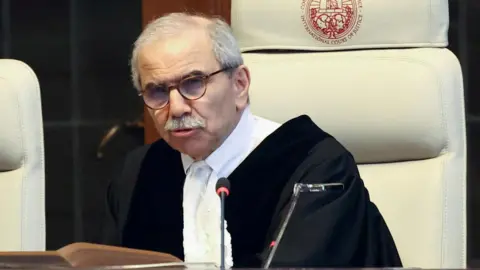 Reuters
ReutersNawaf Salam, president of the International Court of Justice (ICJ) in The Hague, has been named the new Prime Minister of Lebanon.
Two-thirds of 128 MPs appointed the 71-year-old judge to the post – reserved for a Sunni Muslim in a sectarian power-sharing system – during consultations with newly elected President Joseph Aoun. Outgoing Prime Minister Najib Mikati received nine votes.
The presidency announced that Salam would return to Lebanon on Tuesday.
His appointment is a new blow for Hezbollah, which had sought to reappoint Mikati in office but ultimately did not nominate any candidate. The Iran-backed Shiite Muslim militia and political party have been significantly weakened by the recent war with Israel.
Mohammed Raad, a senior Hezbollah MP, accused his opponents of working towards fragmentation and exclusion.
He lamented that his group had “extended its hand” in supporting Aoun’s election, but found itself with “its hand cut off”, and warned that “any government in contradiction with coexistence has no legitimacy “.
However, Hezbollah’s Christian and Sunni allies supported Salam.
Gebran Bassil, the leader of Lebanon’s largest Maronite Christian bloc, called him the “face of reform.” Sunni MP Faisal Karami, meanwhile, said he had appointed the ICJ chief because of demands for “change and renewal” as well as pledges of international support for Lebanon.
Salam is a member of a prominent Sunni family in Beirut. His uncle, Salam, helped Lebanon gain independence from France in 1943 and served several terms as prime minister. His cousin Tammam also served as Prime Minister from 2014 to 2016.
He holds a doctorate in political science from the University of Sciences Po in France, a doctorate in history from the Sorbonne and a master’s degree in law from Harvard Law School.
Salam worked as a lawyer and lecturer at several universities before becoming Lebanon’s permanent representative to the United Nations in New York from 2007 to 2017.
He became a member of the ICJ – the UN’s highest court – in 2018 and was elected president for a three-year term last February. He took over as the ICJ heard a case brought by South Africa accusing Israeli forces of committing genocide against Palestinians in the Gaza Strip. Israel has rejected the allegation as baseless.
Now that he has been designated prime minister by President Aoun, Salam must agree on a ministerial line-up that can win a vote of confidence in Lebanon’s deeply divided parliament.
Former Lebanese army chief Aoun’s bid for the presidency – a role reserved for a Maronite Christian – has been backed by many key political parties in Parliament as well as the United States, France and Saudi Arabia. Saudi.
Hezbollah and its ally Amal voted for him in the second round of last Thursday’s presidential election, following the withdrawal of their preferred candidate.
After the elections, Aoun declared that “a new phase in Lebanon’s history” had begun and pledged to work to ensure that the Lebanese state had “the exclusive right to bear arms” – a reference to the Hezbollah, which has built a force considered more powerful. that the army resisted Israel before its 13-month conflict in violation of a UN Security Council resolution.
The army has not been involved in the war and plays a key role under the ceasefire agreement reached between the Lebanese and Israeli governments in late November. There is a need to deploy soldiers to southern Lebanon as Israeli troops withdraw and ensure that Hezbollah ends its armed presence there by January 26.
Aoun also promised to help the new government advance political and economic reforms widely seen as necessary in a country hit by multiple crises.
Besides the Hezbollah-Israel conflict, they include a six-year economic depression that is one of the worst recorded in modern times, and the 2020 Beirut port explosion that killed more than 200 people.



